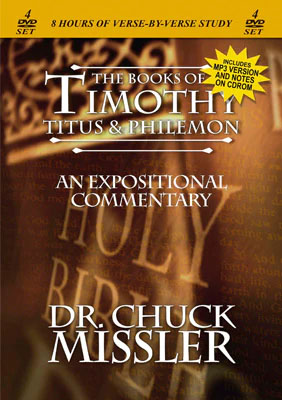Paul wrote four personal letters to three different pastors: Timothy (two), Titus, and Philemon. These letters were also intended for circulation in the churches, but they were specifically to encourage, instruct, and warn pastors faced with the burden of ministering.
If you are saved, you too are in the full-time ministry whether you realize it or not. These letters are for you and me also, not just pastors.
Paul’s four pastoral letters anticipate the very challenges we face today. The early church was composed of real people just like you and me. They had real problems, just as we have now.
They had different styles and different personalities, but they were just regular people, struggling against the powers of darkness, armed with the Word of God and the Holy Spirit.
The Epistles to Timothy
Paul wrote two letters to his young protégé, Timothy. In his first letter, Paul exhorted Timothy to guard the wonderful beginning God had given him. He advised him on the conduct of the assembly, how to have order in the church, and listed the qualifications for elders and deacons.
Second Timothy addresses challenges to faithfulness, and warns of dangers. Some have turned aside. Some have made a shipwreck of their faith. Some shall fall away. Some have turned after Satan. Some have been led astray. Some have missed the mark. All these were real issues then and they are real issues today.
What’s our challenge? To finish well! We celebrate when someone receives Jesus Christ. But salvation is just the beginning, not the climax. You say you are saved; praise God! What have you done with it? Our challenge is to finish well.
I have fought a good fight, I have finished my course, I have kept the faith: Henceforth there is laid up for me a crown of righteousness, which the Lord, the righteous judge, shall give me at that day: and not to me only, but unto all them also that love His appearing.
2 Timothy 4:7-8
Titus
Titus was called Paul’s troubleshooter. One of Paul’s most trusted workers; he accompanied Paul and Barnabas on the difficult visit to the Jerusalem council. (He was probably the only Gentile there.) He was sent on a diplomatic mission to Corinth with a severely worded letter he was charged to deliver and enforce. Paul and Titus traveled to Crete, where Paul left him.
Paul later wrote a letter to Titus which shows Titus again in charge of another difficult situation. Paul ordered him to combat the quarreling and slander by rebuking the hearers and using his full authority to bring order.
Philemon
The finest art galleries reserve a space for choice miniatures. This private, personal note from Paul is a miniature masterpiece of courtesy, tact, and even playful wit. It also serves as an example of intercession.
Paul lived in Colossi, and Onesimus was a slave owned by Philemon. Onesimus had run away, met Paul, and had been converted. Paul encouraged him to turn himself in to Philemon, who had also been converted by Paul. Onesimus delivered the epistle to the Colossians and took this private note to Philemon.
Philemon had every legal right to kill Onesimus as a runaway slave, but Paul knew Onesimus was a changed person; he just had to convince Philemon. Paul praised Philemon and offered, “Whatever he owes you, charge it to me.” But then he points out, “By the way, Philemon, you owe me your life—keep that in the balance.” There was some playfulness there, but Paul gave his pledge of assurance and benediction. It is a charming little letter, but it is also a model of intercession and sponsorship.







